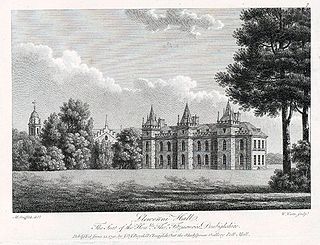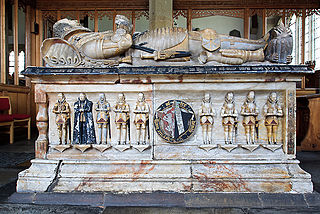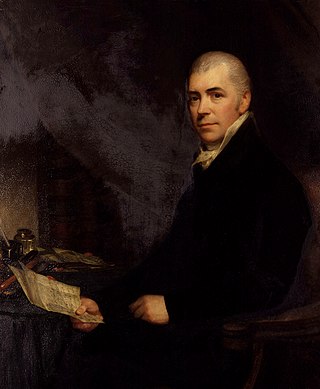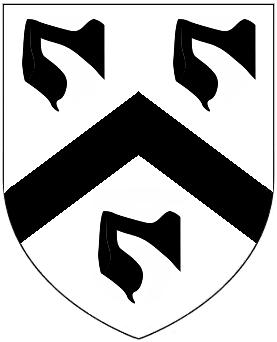Related Research Articles
The Salusbury family is an Anglo-Welsh family notable for their social prominence, wealth, literary contributions and philanthropy.
Sir Thomas Myddelton was a Welsh merchant who was Lord Mayor of London before becoming a Member of Parliament for London.

Lleweni Hall was a stately home in Denbighshire, northeast Wales, around 2 miles (3.2 km) north-east of Denbigh on the banks of the River Clwyd. It was the principal seat of the Salusbury family and their descendants from 1289 until 1748, and the present territorial designation of the most senior branch of the family.
Sir John Salusbury was a Welsh nobleman, explorer and co-founder of Halifax, Nova Scotia. He is credited as being one of the founders of modern Canada along with several other members of his expedition, including the Earl of Halifax and Edward Cornwallis. He served on the Nova Scotia Council throughout Father Le Loutre's War. He participated in the Battle at Chignecto. His diaries regarding the military campaign to establish a colony in Nova Scotia on behalf of the British Government became a vital source of information regarding the hardships, difficulties and opposition from the average Englishman regarding the development of the colony. He was a direct descendant of Katheryn of Berain.
Sir William Williams, 2nd Baronet, of Glascoed, Llansilin, Denbighshire was a Welsh landowner and Tory politician who sat in the House of Commons from 1708 to 1710.

Sir Watkin Williams-Wynn, 5th Baronet was a Welsh landowner and Tory politician who sat in the House of Commons from 1794 to 1840.

Sir Robert Salusbury Cotton, 5th Baronet was an English politician who sat in the House of Commons from 1780 to 1796.

Sir Robert Cotton, 1st Baronet was an English politician. He was Member of Parliament (MP) for Cheshire from 1679 to 1681 and from 1689 to 1702.

There have been two baronetcies created for members of the Salusbury family, the first in the Baronetage of England and the second in the Baronetage of Great Britain. Neither title has survived to the present day although the senior baronetcy is technically considered to be dormant.

Sir Thomas Salusbury, 2nd Baronet was a Welsh poet, politician and soldier, who supported King Charles I in English Civil War and was a colonel of a Royalist regiment.
Three baronetcies were created for different families bearing the name of Halford, but related to one another. The first baronetcy was created in 1641 for Richard Halford in the Baronetage of England. It became extinct in 1780 with the death of the seventh and last baronet. The second baronetcy was created in 1706, also in the Baronetage of England, but became extinct in 1720 in the second generation. The third and last baronetcy was created in 1809 in the Baronetage of the United Kingdom for a prominent physician descended maternally from the fifth Baronet of the previous creation. It too became extinct with the death of the fourth Baronet in 1897.

Sir Henry Halford, 1st Baronet, GCH, born Henry Vaughan, was president of the Royal College of Physicians for 24 years. As the royal and society physician, he was physician extraordinary to King George III from 1793 to 1820, then as physician in ordinary to his three successors – George IV, William IV and the young Victoria. He also served other members of the Royal Family until his death.
Sir Thomas Trevor, 1st Baronet was a Welsh politician who sat in the House of Commons of England variously between 1640 and 1648.

Sir Richard Myddelton, 3rd Baronet, of Chirk Castle, Denbighshire, was a Welsh landowner and Tory politician who sat in the House of Commons from 1685 to 1716.

Sir Thomas Myddelton, 2nd Baronet was a Welsh politician who sat in the House of Commons between 1679 and 1681.

Sir Edward Mansel, 4th Baronet was a Welsh politician who sat in the House of Commons in three periods between 1660 and 1689.

Sir Baynham Throckmorton, 3rd Baronet of Clearwell, Gloucestershire was an English politician who sat in the House of Commons at various times between 1656 and 1679.
Sir Edward Hales, 2nd Baronet was an English politician who sat in the House of Commons from 1660 to 1681.
Sir Thomas Cotton, 2nd Baronet was an English peer and officer of the Crown.

Sir Thomas Reade, 4th Baronet, of Shipton Court, Oxfordshire was a British courtier and Whig politician who sat in the House of Commons for 34 years from 1713 to 1747.